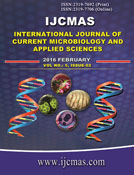


 National Academy of Agricultural Sciences (NAAS)
National Academy of Agricultural Sciences (NAAS)

|
PRINT ISSN : 2319-7692
Online ISSN : 2319-7706 Issues : 12 per year Publisher : Excellent Publishers Email : editorijcmas@gmail.com / submit@ijcmas.com Editor-in-chief: Dr.M.Prakash Index Copernicus ICV 2018: 95.39 NAAS RATING 2020: 5.38 |
Mints were aromatic plants belong to the family Lamiaceae. Mentha piperita was the most important herb of this family exploited widely for medicinal purpose making the natural resource threatened. High costs and high demand of this plant for manual labor disallowed large scale propagation with green cuttings. As all species of this genus contained high amount of secondary metabolites, in vitro rapid propagation for production of improved clones was desirable for conservation and commercial exploitation. The aim of the present report was to conserve this medicinal plant for future exploitation through in vitro propagation to evaluate the antioxidative potential of the tissue culture derived clones and to compare it with the in vivo field grown plants so that tissue culture derived plants can be taken in future as an alternative to the naturally grown threatened plants. It was observed that the antioxidant property of the field grown plants were well maintained in the tissue culture derived plant suggesting (total phenols 6.02±0.03 mg GAE/g, rosmarinic acid 7.28±0.28 mg/g, total flavonoid content 49.290±0.48 mg QE/g) in vitro regeneration as an alternative for sustainable use of this medicinally important threatened plant.
 |
 |
 |
 |
 |